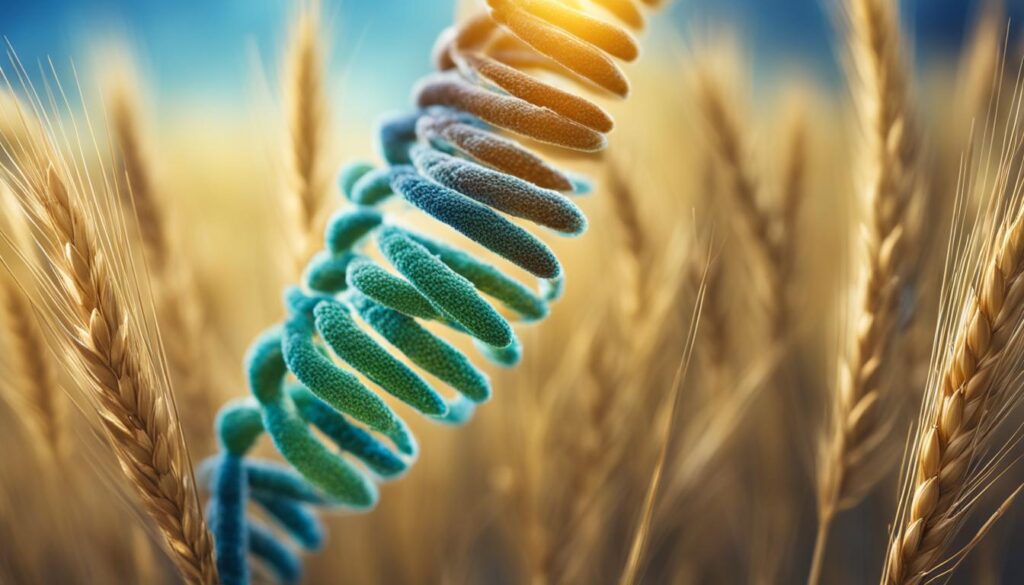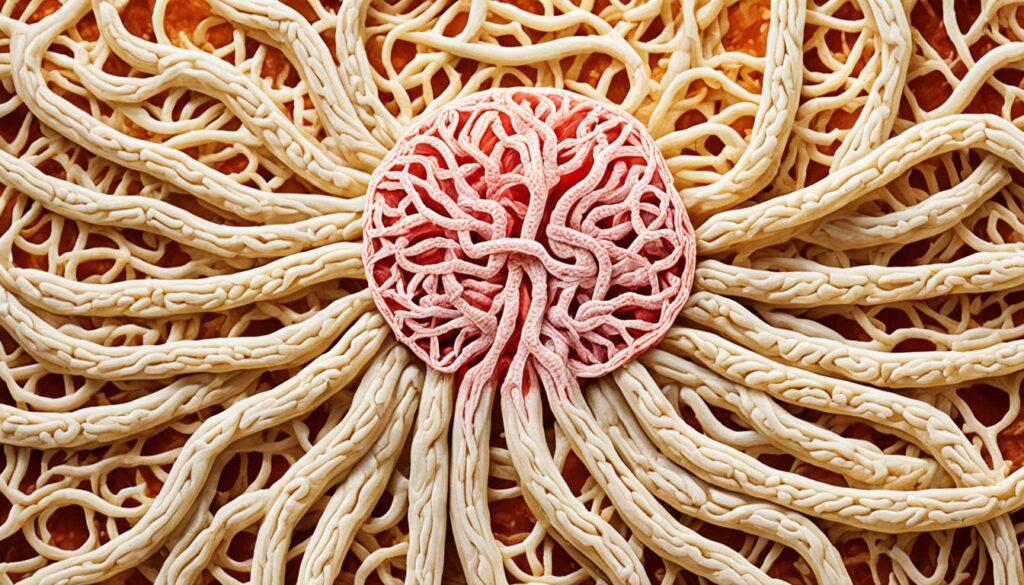Welcome to our comprehensive guide on celiac disease and living a gluten-free lifestyle in India. If you suspect you or someone you know may have celiac disease, it’s essential to understand the signs, symptoms, and safe food options available to you. Celiac disease is an immune reaction to eating gluten, a protein found in wheat, barley, and rye. It damages the lining of the small intestine, preventing the absorption of vital nutrients.
Table of Contents
ToggleRecognizing the signs of celiac disease is crucial for early diagnosis. Symptoms can range from digestive issues like diarrhea, weight loss, and bloating to non-digestive symptoms including anemia, skin rash, headaches, and fatigue. If you experience any of these symptoms, it is important to consult a healthcare professional for proper diagnosis.
Once diagnosed, managing celiac disease involves following a strict gluten-free diet. This means avoiding foods containing gluten, such as wheat, barley, rye, and certain oats. In India, there is a growing availability of gluten-free options in grocery stores, and a variety of gluten-free recipes and products are accessible. It is also essential to be aware of hidden sources of gluten in processed foods, sauces, dressings, and medications to maintain a truly gluten-free lifestyle.
Our guide will provide you with all the information you need to navigate the gluten-free lifestyle in India. From safe foods to avoid to tips for a gluten-free kitchen, we have you covered. Stay tuned for more articles on celiac disease and discover how you can effectively manage your condition and improve your quality of life.
What is Celiac Disease?
Celiac disease is a condition that affects the small intestine and impairs the body’s ability to absorb nutrients. It is triggered by the consumption of gluten, a protein found in wheat, barley, and rye. When individuals with celiac disease are exposed to gluten, their immune system mounts an abnormal response that causes damage to the tiny hairlike projections called villi in the small intestine.
The villi play a crucial role in absorbing nutrients from food, but when they are damaged, the absorption process is compromised. This condition is known as malabsorption, which leads to deficiencies in essential vitamins, minerals, and other nutrients that are necessary for overall health and growth.
Gluten exposure is the main culprit behind the immune response that damages the villi. Even small amounts of gluten can trigger this reaction in individuals with celiac disease, causing ongoing harm to the small intestine. It’s important to note that celiac disease is not the same as a gluten allergy or gluten sensitivity, although these conditions may cause similar symptoms.
The damage to the villi and the resulting malabsorption in celiac disease can lead to a range of symptoms and complications. The severity of symptoms can vary widely among individuals, and some people may experience no obvious symptoms at all. It is crucial to seek medical diagnosis and adopt a gluten-free diet to manage the condition effectively and reduce the risk of long-term complications.
Functions of Villi in the Small Intestine
| Functions | Description |
|---|---|
| Increased Surface Area | Villi greatly increase the surface area of the small intestine, allowing for efficient absorption of nutrients. |
| Nutrient Absorption | Villi absorb nutrients such as carbohydrates, proteins, fats, vitamins, and minerals from digested food. |
| Enzyme Production | Cells in the villi produce enzymes to further digest food and facilitate nutrient absorption. |
| Immune Defense | Villi play a role in the immune response of the intestinal tract, protecting against harmful bacteria and pathogens. |
Symptoms of Celiac Disease
The symptoms of celiac disease can vary greatly and may be different in children and adults. It is important to be aware of both the digestive and non-digestive symptoms associated with the condition. Understanding these symptoms can help in early diagnosis and proper management of celiac disease.
Digestive Symptoms
In adults, digestive symptoms of celiac disease often include:
- Diarrhea
- Fatigue
- Weight loss
- Bloating
- Abdominal pain
- Nausea

In addition to these symptoms, more than half of adults with celiac disease also experience non-digestive symptoms. These can include:
- Anemia
- Bone loss
- Skin rash
- Mouth ulcers
- Headaches
- Neurological problems
Symptoms in Children
Children with celiac disease often have different symptoms than adults. Common digestive symptoms in children include:
- Nausea
- Diarrhea
- Constipation

Children may also experience:
- Growth and development issues
- Tooth enamel damage
- Neurological symptoms such as ADHD and seizures
If you or your child are exhibiting any of these symptoms, it is important to consult a healthcare professional to determine if celiac disease may be the underlying cause. Early detection and proper management of celiac disease can lead to improved health outcomes and a better quality of life.
| Common Digestive Symptoms in Adults | Non-Digestive Symptoms in Adults |
|---|---|
| Diarrhea | Anemia |
| Fatigue | Bone loss |
| Weight loss | Skin rash |
| Bloating | Mouth ulcers |
| Abdominal pain | Headaches |
| Nausea | Neurological problems |
| Common Digestive Symptoms in Children | Other Symptoms in Children |
|---|---|
| Nausea | Growth and development issues |
| Diarrhea | Tooth enamel damage |
| Constipation | Neurological symptoms (ADHD, seizures) |
Causes and Risk Factors
The exact cause of celiac disease is not known, but it is believed to be a combination of genetic and environmental factors. People with certain genes are more susceptible to developing celiac disease when exposed to gluten. Other risk factors include having a family member with celiac disease, having other autoimmune diseases, and certain genetic disorders like Down syndrome or Turner syndrome. Other factors that may contribute to the development of celiac disease include early exposure to gluten, gastrointestinal infections, and gut bacteria.
Risk Factors for Celiac Disease
Several factors increase the risk of developing celiac disease. These include:
- Genes: Certain genes, such as HLA-DQ2 and HLA-DQ8, are associated with an increased risk of developing celiac disease.
- Family History: Having a family member with celiac disease increases the likelihood of developing the condition.
- Autoimmune Diseases: Having other autoimmune diseases, such as type 1 diabetes or rheumatoid arthritis, increases the risk of celiac disease.
- Genetic Disorders: Certain genetic disorders, including Down syndrome and Turner syndrome, are associated with an increased risk of celiac disease.
Environmental Factors
Along with genetic factors, environmental factors play a role in the development of celiac disease:
- Gluten Exposure: Gluten exposure is necessary for celiac disease to develop. Consuming foods that contain gluten triggers an immune response in susceptible individuals.
- Early Exposure to Gluten: Introducing gluten to an infant’s diet before they are 3 months old may increase the risk of developing celiac disease.
- Gastrointestinal Infections: Certain infections, such as rotavirus or a severe bout of gastroenteritis, may trigger celiac disease in genetically susceptible individuals.
- Gut Bacteria: The composition of gut bacteria may influence the development of celiac disease, but more research is needed to understand the exact role.

| Risk Factors | Explanation |
|---|---|
| Genes | Certain genes, such as HLA-DQ2 and HLA-DQ8, increase the risk of developing celiac disease when exposed to gluten. |
| Family History | Having a close family member with celiac disease increases the likelihood of developing the condition. |
| Autoimmune Diseases | Having other autoimmune diseases like type 1 diabetes or rheumatoid arthritis increases the risk of celiac disease. |
| Genetic Disorders | Certain genetic disorders, such as Down syndrome or Turner syndrome, are associated with an increased risk of celiac disease. |
| Gluten Exposure | Consuming foods containing gluten triggers an immune response in susceptible individuals, leading to celiac disease. |
| Early Exposure to Gluten | Introducing gluten to an infant’s diet before they are 3 months old may increase the risk of developing celiac disease. |
| Gastrointestinal Infections | Some infections, such as rotavirus or gastroenteritis, may trigger celiac disease in genetically susceptible individuals. |
| Gut Bacteria | The composition of gut bacteria may play a role in the development of celiac disease, though more research is needed. |
Complications of Celiac Disease
Untreated or unmanaged celiac disease can give rise to various complications. Let’s take a closer look at some of them:
1. Malnutrition
Celiac disease can lead to malnutrition due to the small intestine’s inability to absorb essential nutrients. This can cause weight loss, anemia, and growth problems in children. It is crucial to ensure proper nutrient intake to avoid these issues.
2. Bone Weakening
Calcium and vitamin D malabsorption in celiac disease can result in bone weakening. This can lead to osteoporosis in adults and softening of bones in children. Taking measures to strengthen and maintain bone health is essential for individuals with celiac disease.
3. Infertility and Miscarriage
Nutrient deficiencies caused by untreated celiac disease can contribute to infertility and an increased risk of miscarriage. It is crucial to address these deficiencies and seek appropriate medical guidance to promote reproductive health.
4. Increased Cancer Risk
Untreated celiac disease may increase the risk of developing certain types of cancer, particularly intestinal lymphoma and small bowel cancer. Regular monitoring and appropriate preventive measures are necessary to manage this increased risk.
5. Nonresponsive Celiac Disease
Some individuals with celiac disease may experience nonresponsiveness to a gluten-free diet. This means they do not fully recover or respond to the diet alone. Further testing and treatment options may be required to manage and alleviate symptoms for such individuals.
In order to prevent these complications, it is crucial to diagnose and manage celiac disease effectively. By following a strict gluten-free diet and working closely with healthcare professionals, individuals with celiac disease can minimize the risk of complications and lead a healthier life.
Now, let’s take a look at a table summarizing the complications of celiac disease:
| Complication | Description |
|---|---|
| Malnutrition | Inability to absorb nutrients, leading to weight loss, anemia, and growth issues |
| Bone Weakening | Calcium and vitamin D malabsorption, resulting in osteoporosis and bone softening |
| Infertility and Miscarriage | Nutrient deficiencies affecting reproductive health |
| Increased Cancer Risk | Elevated risk of intestinal lymphoma and small bowel cancer |
| Nonresponsive Celiac Disease | Lack of improvement or response to a gluten-free diet |
Remember, managing celiac disease effectively through proper treatment and adherence to a gluten-free lifestyle is key to reducing the risk of these complications.

Diagnosis and Treatment
The diagnosis of celiac disease involves several steps. A blood test can detect high levels of certain antibodies that suggest the presence of celiac disease. Genetic testing can determine if you have the genes associated with celiac disease. Table: Diagnosis of Celiac Disease
| Diagnostic Test | Procedure |
|---|---|
| Blood Test | A sample of your blood is taken to check for the presence of certain antibodies that indicate celiac disease. |
| Genetic Testing | A simple mouth swab or blood test can determine if you have the genetic markers associated with celiac disease. |
| Biopsy | A small sample of tissue from your small intestine is taken during an endoscopy procedure to check for damage to the villi. |
A biopsy of the small intestine can confirm the diagnosis by showing damage to the villi, which are tiny hairlike projections responsible for absorbing nutrients. The only treatment for celiac disease is a strict gluten-free diet. This means avoiding all foods and products containing gluten, including wheat, barley, rye, and some oats. It’s important to carefully read labels and be aware of hidden sources of gluten in processed foods and medications.
Consultation with a healthcare professional and a registered dietitian is recommended for guidance in managing the gluten-free diet. They can provide personalized advice and support to help you make informed choices and ensure that your diet is balanced and meets your nutritional needs.
Living Gluten-Free
Adopting a gluten-free lifestyle is vital for managing celiac disease and ensuring your overall well-being. By following a strict gluten-free diet, you can alleviate symptoms, promote better health, and prevent complications. Here are some essential tips to help you navigate the gluten-free journey:
1. Identify and Avoid Foods that Contain Gluten
Being aware of what foods to avoid is crucial. Steer clear of wheat, barley, rye, and some oats, as they all contain gluten. Check ingredient labels carefully, as gluten can hide in processed foods, sauces, dressings, and even medications. Be cautious of cross-contamination in shared kitchen spaces.
2. Explore Gluten-Free Options
Fortunately, many grocery stores now offer a wide range of gluten-free products. Look for gluten-free alternatives to your favorite foods, such as bread, pasta, and snacks. Experiment with gluten-free recipes and explore the vast selection of gluten-free flours, grains, and baked goods available.
3. Be Mindful of Hidden Sources of Gluten
Gluten can be hidden in unexpected places, such as soy sauce, salad dressings, and even certain types of candies. Familiarize yourself with different names for gluten, like modified food starch and malt flavoring. Be vigilant when dining out and ask questions to ensure your meals are gluten-free.
4. Establish a Gluten-Free Kitchen
To prevent cross-contamination, it’s essential to separate your kitchen items used for gluten-free foods. Designate specific cutting boards, utensils, and cooking equipment for gluten-free preparation. Ensure proper cleaning and storage practices to avoid accidental exposure to gluten.
5. Seek Support and Resources
Navigating a gluten-free lifestyle can be challenging, but you’re not alone. Joining support groups and online communities can provide a wealth of information, tips, and encouragement. Connect with individuals who share similar experiences and learn from their insights and advice.
Embrace the gluten-free journey as an opportunity to explore new foods, prioritize your health, and discover a vibrant and fulfilling lifestyle. By adhering to a gluten-free diet and making conscious choices, you can effectively manage your celiac disease and unlock a world of delicious and nutritious possibilities.
| Foods to Avoid | Hidden Sources of Gluten |
|---|---|
| Wheat | Soy Sauce |
| Barley | Sausages |
| Rye | Salad Dressings |
| Some Oats | Processed Meats |
Conclusion
Celiac disease is a chronic condition that requires lifelong management through a strict gluten-free diet. By following a gluten-free lifestyle, you can effectively manage your symptoms, prevent complications, and improve your overall health and well-being. It is crucial to seek guidance from healthcare professionals, such as doctors and dietitians, who can provide accurate diagnosis, personalized guidance, and ongoing support.
With proper management and adherence to a gluten-free diet, you can lead a healthy and fulfilling life. Remember, celiac disease is a serious condition, and it is essential to take it seriously. Make sure to carefully read ingredient labels, be aware of hidden sources of gluten, and separate your kitchen items to avoid cross-contamination.
By prioritizing celiac disease management and embracing a gluten-free lifestyle, you can enjoy a wide variety of safe and delicious foods. Many grocery stores now offer gluten-free options, and there are numerous gluten-free recipes and products available. Additionally, joining support groups and online communities can provide valuable resources, tips, and a sense of belonging on your gluten-free journey. Together, we can navigate the challenges of celiac disease and live our best lives.
FAQ
What is celiac disease?
Celiac disease is an immune reaction to eating gluten, a protein found in wheat, barley, and rye. It damages the lining of the small intestine and prevents the absorption of nutrients.
What are the symptoms of celiac disease?
The symptoms of celiac disease can vary, including digestive symptoms like diarrhea, weight loss, and bloating, as well as non-digestive symptoms such as anemia, skin rash, headaches, and fatigue.
What causes celiac disease?
The exact cause of celiac disease is not known, but it is believed to be a combination of genetic and environmental factors. People with certain genes are more susceptible to developing celiac disease when exposed to gluten.
What are the complications of celiac disease?
If left untreated or unmanaged, celiac disease can lead to complications such as malnutrition, bone weakening, infertility, and an increased risk of certain cancers.
How is celiac disease diagnosed and treated?
The diagnosis of celiac disease involves several steps, including blood tests, genetic testing, and a biopsy of the small intestine. The only treatment for celiac disease is a strict gluten-free diet.
How can I live a gluten-free lifestyle?
Living a gluten-free lifestyle involves avoiding foods and products that contain gluten, reading ingredient labels, being aware of hidden sources of gluten, and separating kitchen items used for gluten-free foods.
How can I prevent complications of celiac disease?
Proper management of celiac disease through a gluten-free diet can help prevent complications. It is important to work with healthcare professionals for accurate diagnosis, guidance, and support.


